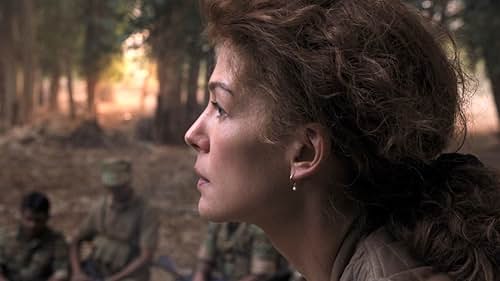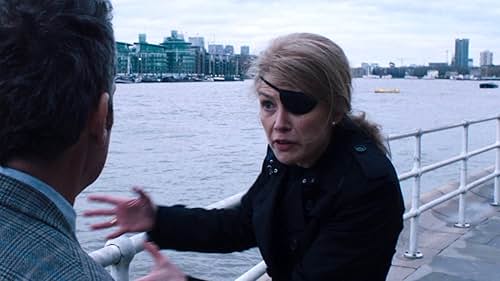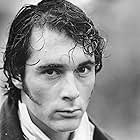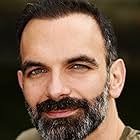Eine der berühmtesten Kriegskorrespondenten unserer Zeit, Marie Colvin, ist ein absolut furchtloser und rebellischer Geist, der an die vorderste Front von Konflikten auf der ganzen Welt getr... Alles lesenEine der berühmtesten Kriegskorrespondenten unserer Zeit, Marie Colvin, ist ein absolut furchtloser und rebellischer Geist, der an die vorderste Front von Konflikten auf der ganzen Welt getrieben wird, um den Stimmlosen eine Stimme zu geben.Eine der berühmtesten Kriegskorrespondenten unserer Zeit, Marie Colvin, ist ein absolut furchtloser und rebellischer Geist, der an die vorderste Front von Konflikten auf der ganzen Welt getrieben wird, um den Stimmlosen eine Stimme zu geben.
- Regie
- Drehbuch
- Hauptbesetzung
- Auszeichnungen
- 2 Gewinne & 10 Nominierungen insgesamt
- Iraqi Militia Captain
- (as Nadeem Srouji)
Empfohlene Bewertungen
Based on Marie Brenner's Vanity Fair article "Marie Colvin's Private War" (screenplay by Arash Amel), the film benefits from the extraordinary and courageous work of Ms. Colvin, and also a terrific performance from Rosamund Pike (words I've not previously written). Ms. Pike captures the extremes of Ms. Colvin's life - the atrocities of war and the self-prescribed treatment of her PTSD through vodka, and does so in a manner that always seems believable. She lets us in to a world most of us can't imagine.
As a war correspondent for Britain's Sunday Times (since 1986), Ms. Colvin told the stories we'd rather not know. In her words, "I saw it, so you don't have to." The film begins with a stunning overhead view of 2012 war-ravaged Homs Syria (destruction courtesy of Assad's soldiers) - a place that starts the film and later ends the story. We then flash back to 2001 London so we can witness Marie in society and struggling with a personal relationship. She then chooses, against her editor's (Tom Hollander) guidance to cover Sri Lanka. It's a decision that cost her an eye, while also providing her recognition as the eye-patch wearing female war reporter.
In 2003, a tip takes her to a previously undiscovered mass grave site in Fallujah. This is her first work alongside photographer Paul Conroy (played by Jamie Dornan). Having "seen more war than most soldiers", Ms. Colvin's severe alcoholism can't kill the nightmares, visions, and PTSD. After time in a clinic, she returns to work. We see her in 2009 Afghanistan and then pulling no punches when interviewing Libya's Muammar Gaddafi in 2011. During these assignments, we learn much about Ms. Colvin's personality and approach. She is rarely without a cigarette, admits to wearing Le Perla lingerie (and why), carries Martha Gellhorn's "The Face of War" as her field manual, and wins two British Foreign Journalist of the Year awards - though seeing her at the banquets is quite surreal.
Hollander's subtle performance as news editor Sean Ryan is also quite impressive. He fears for her safety (and even questions her sanity) but is in constant conflict with the need to sell newspapers - something Ms. Colvin's stories certainly did. Stanley Tucci has a role as Tony Shaw, her love interest, but despite her words, we never believe he and his sailboat are ever more than a distraction from her obsession with the front lines. The final sequence in 2012 Homs Syria is stunning, as is her final interview with Anderson Cooper on CNN.
Ms. Pike has altered her voice to mimic the deeper tone of Marie Colvin - her efforts confirmed in the final interview played at the film's end. It's quite a career boost for Ms. Pike, who has previously been known for playing ice queens in films like GONE GIRL. She captures the traumatized Marie, but also the obsession of someone whose DNA constantly drove her back to the stories that needed to be told.
Director Heineman's unique perspective combined with the cinematography of 3 time Oscar winner Robert Richardson (a favorite of Scorcese, Tarantino, and Oliver Stone) delivers a realism of war that we rarely see on screen. Mr. Richardson also shot SALVADOR (1986) and PLATOON (1986) and his work here surpasses both. The film gives us a glimpse at the psychological effects of such reporting, and a feel for the constant stress of being surrounded by tragedy and danger. This is fitting tribute to a courageous and very skilled woman, although I do wish the men weren't constantly helping her out of trucks and jeeps.
Despite 'A Private War' being critically well received and Pike's performance being pretty much universally acclaimed, when finally released in my country it was criminally and shamefully underseen with hardly any advertising and a limited cinema release (the few cinemas that did show it had screenings at inaccessible times). Much more than this incredible woman and her story deserved and for the film to get this treatment is an injustice. Finally seeing it a few days ago, it was well worth the wait because while not perfect 'A Private War' was a powerful experience. Actually felt it treated Colvin and her story with respect and subjectively feel that some of the criticisms it's garnered here are unfair and over-the-top to the point of disrespect.
'A Private War' is not perfect. There are time jumps back and forth that can feel rather jumpy and rushed, so it's a little disjointed at times.
Stanley Tucci is far too underused in a very underwritten part, Tucci plays it well and gives it a good bash but it is hard to do more with limited screen time, a sketchily developed character and some of the film's more clunky dialogue.
However, 'A Private War' has a lot working in its favour. The production values are both beautiful and grittily unforgiving, with editing that really adds to the increasingly hard-hitting authenticity and a striking wide variety of camera shots that don't give the impression of being too clever or showing off, instead doing what the editing excels in. Matthew Heinemann directs with enough momentum and breathing space with no visual self-indulgence at the same time, especially good in the latter stages. The music is used in the appropriate places, recorded without being too loud and has the right amount of unsettlement. Am surprised that hardly anybody has mentioned Annie Lennox's Golden Globe-nominated original song "Requiem for a Private War", truly haunting stuff.
Other than some melodramatic moments, the script is thought-probing and poignant and one feels constant admiration for Colvin. While the back and forth structure was flawed, the story still continued to grip and the film does deserve credit for not trivialising the subject. It actually pulls no punches and is not an easy watch (both her bleak personal life and the job), doing so in a harrowing way and it had me emotionally drained by the end, more so than most films seen recently. Did not feel 'A Private War' glorified Colvin or villified anybody else, and thought a difficult story was treated with respect.
Have a lot of praise for the cast too. Jamie Dornan shows that in the right role with good writing he can be good, a very deeply felt performance, while Tom Hollander is also very good. 'A Private War' though belongs to Pike, who is absolutely exceptional as Colvin, one of the best of the year in my view, and it is a mystery that she didn't get more awards attention. Giving a lead performance as fearless and intensely committed as Colvin herself, doing it while disappearing into the role and becoming her and not being an impersonation, have always liked her a lot but her performance is is on the same level as her unforgettable turn in 'Gone Girl' in its own way.
In conclusion, very well done film though a hard watch. To be seen mainly for Pike. 8/10
On the other hand, the whole thing just felt quite clunky and disjointed. I didn't really learn a whole lot about the conflicts Marie Colvin was reporting on. There was often context missing to scenes and this lead to a little confusion or waning interest on my behalf. Rosamund Pike delivers a strong performance though and it was enough to draw me back in.
There was also just a whole lot of stupidity going on. Sorry, but when one of Marie's colleagues said in the film: "You've got an amazing nose for a story. But you don't have a military brain" - I couldn't help but agree wholeheartedly. It was a frustrating watch at times.
It was a serviceable film though and there's enough here to hold any journalism students' attention. It's important to have journalists of Marie's calbire in our world today.
It is a brutal story, and it is very tough to watch. It is a pity that I find the film not add engaging or moving as the filmmakers hoped. Somehow the film comes across as a hybrid between a documentary and a drama, with a passionate protagonist that remains detached at the same time. It is a strange feeling.
Thrilling and thorny film with fine actors regarding the world of the war correspondents. This tense and nail-biting biograpical thriller is packed with as much taut action , enjoyable message as the storyline will allow , but let down at times due to its slowness and coldness. Engaging and raw film being compellingly shot , adding some political moments and its allegedly wave flag of impartiality cannot obscure the tension dripping from every frame of such reconstructed immediacy. Stars Rosamund Pike who gives a very acting as the brave correspondent who sacrifices loving relationships -to her lover Stanley Tucci- , and over time, her personal life starts to unravel as the trauma she's witnessed takes its toll. The film follows her fruitful career with United Press International (UPI), a year after graduating from Yale. She worked for UPI first in Trenton, then New York and Washington. In 1984, Colvin was appointed Paris bureau manager for UPI, before moving to The Sunday Times in 1985. From 1986, she was the newspaper's Middle East correspondent, and then from 1995 was the Foreign Affairs correspondent. In 1986, she was the first to interview Libyan leader Muammar Gaddafi after Operation El Dorado Canyon. Gaddafi said in this interview that he was at home when U. S. planes bombed Tripoli in April 1986, and that he helped rescue his wife and children while "the house was coming down around us".
The movie belongs to sub-genre that abounded in the 80s about reporters all around the world covering dangerous political conflicts , such as Indonesia in ¨The Year of Living Dangerously¨(1982) by Peter Weir with Mel Gibson , Sigourney Weaver, Linda Hunt ; Salvador in ¨Salvador¨ by Oliver Stone with James Woods and James Belushi, Libano in ¨Deadline¨ by Nathaliel Gutman with Christopher Walken and Hywel Bennett and Nicaragua ¨Under fire¨ (1983) shot by Roger Spottiswoode with Nick Nolte, Gene Hackman, Joanna Cassidy .
Adding more biographical data to those already presented in the film, these are the following: Marie Catherine Colvin ( 1956 -2012) was an American journalist who worked as a foreign affairs correspondent for the British newspaper The Sunday Times from 1985 until her death. She was one of the most prominent war correspondents of her generation, widely recognized for her extensive coverage on the frontlines of various conflicts across the globe. On February 22, 2012, while she was covering the siege of Homs alongside the French photojournalist Rémi Ochlik, the pair were killed in a targeted attack made by Syrian government forces. After her death, Stony Brook University established the Marie Colvin Center for International Reporting in her honor. Her family also established the Marie Colvin Memorial Fund through the Long Island Community Foundation, which strives to give donations in Marie's name in honor of her humanitarianism. In July 2016, lawyers representing Colvin's family filed a civil action against the Syrian Arab Republic in the US District Court for the District of Columbia, claiming they had obtained proof that the Syrian government had directly ordered her assassination. In a verdict issued in 2019, the Columbia District Court found the Assad regime guilty of "extrajudicial killing", terming it as an "unconscionable crime" deliberately committed by the government, and mandated Syria to pay Colvin's family $302 million in compensation for the damages.
WUSSTEST DU SCHON:
- WissenswertesIn a piece for Harper's Bazaar dated 4 December 2018, war correspondent Janine di Giovanni, who knew Marie Colvin, writes critically of the film: "There were no good guys at the Sunday Times, where Colvin worked, who cared for her well-being. There were instead editors who wanted scoops at the expense of the safety of their reporters. Colvin had many friends in London, but none of them were similar to the Bridget Jones-style girlfriend character (portrayed by Nikki Amuka-Bird) in the film. Her last boyfriend was not a caring and loving Stanley Tucci but rather a man who gave her immense heartache and distress. There were no 'heads on sticks' in Bosnia, as the character meant to be Colvin's first husband, Patrick Bishop, says in one of the opening scenes (heads were on sticks in Chechnya). Colvin's second husband, Juan Carlos Gumucio, is erased from the script altogether, though he played an important role in her life." Although positive about Rosamund Pike's performance, she recommends that her readers watch the documentary Bearing Witness (2005) instead.
- PatzerColvin's smoking sometimes does not sync - holding, inhales, exhales.
- Zitate
Newspaper Editor: Why is it important, do you think, to see this images? Why is it important for you to be there? Right now you may be one of the only Western journalists in Homs. Our team has just left.
Marie Colvin: For an audience for which any conflict is very far away, this is the reality. There are 28,000 civilians, men, women and children, a city of the cold and hungry, starving, defenseless. There are no telephones. The electricity has been cut off. Families are sharing what they have with relatives and neighbors. I have sat with literally hundreds of women with infant children who are trapped in these cold, brutal conditions, unable to feed their children anything other than sugar and water for weeks on end. That little boy was one of the two children who died today. It's what happens every day. The Syrian regime is claiming that they're not hitting civilians, that they're just going after terrorist gangs. But every civilian house has been hit. The top floor of the building I'm in has been totally destroyed. There are no military targets here. It is a complete and utter lie.
Newspaper Editor: Well, thank you for using the word " lie ". I think a lot of people wanna thank you, because it's a word we don't often hear, it's not often used, but it is the truth in this case. The Syrian regime, their representatives, have continually lied. They've lied on this program to us directly. Marie, I mean, you have covered a lot of conflicts over a long time. How does this compare?
Marie Colvin: This is the worst conflict I've ever seen. It's the worst because it was a peaceful uprising that was crushed by violence. President Assad is sitting in his palace in Damascus in panic, the entire security apparatus his father built crumbling around him, and he is responding in the only way he's been taught how. When he was a child, he watched his father crush oppositions by shelling the city of Hama into ruins and killing 10,000 innocent civilians. He watched, as we're watching, a dictator killing with impunity. And the words on everybody's lips here are, " Why have we been abandoned? ". " Why? ". I don't know why.
- Crazy CreditsImages of Colvin's newspaper articles for the Sunday Times are shown behind the initial credits.
- VerbindungenFeatured in CTV News at 11:30 Toronto: Folge vom 14. September 2018 (2018)
Top-Auswahl
Everything New on Max in May
Everything New on Max in May
Details
- Erscheinungsdatum
- Herkunftsländer
- Offizielle Standorte
- Sprache
- Auch bekannt als
- Приватна війна
- Drehorte
- Jordanien(on location)
- Produktionsfirmen
- Weitere beteiligte Unternehmen bei IMDbPro anzeigen
Box Office
- Budget
- 18.800.000 $ (geschätzt)
- Bruttoertrag in den USA und Kanada
- 1.633.208 $
- Eröffnungswochenende in den USA und in Kanada
- 60.491 $
- 4. Nov. 2018
- Weltweiter Bruttoertrag
- 3.915.207 $
- Laufzeit1 Stunde 50 Minuten
- Farbe
- Seitenverhältnis
- 2.39 : 1
Zu dieser Seite beitragen









































